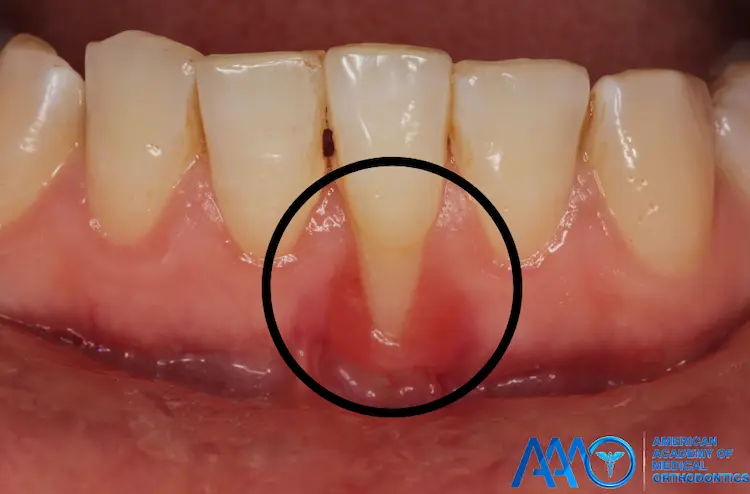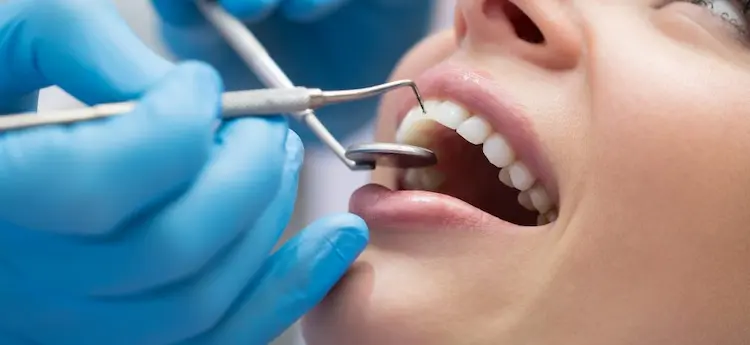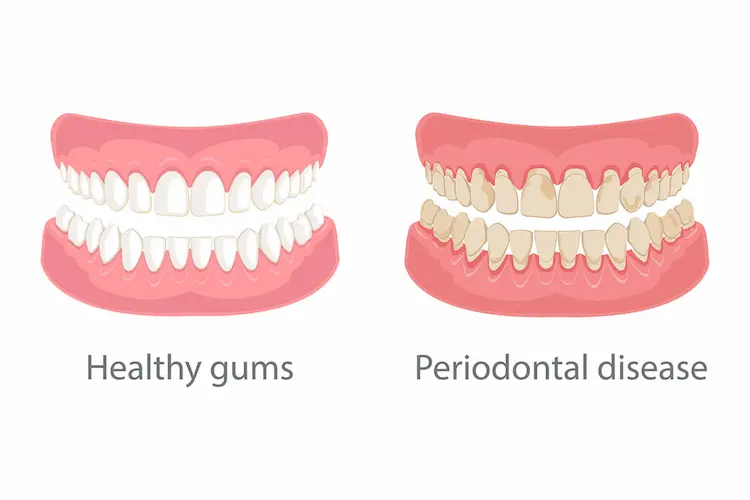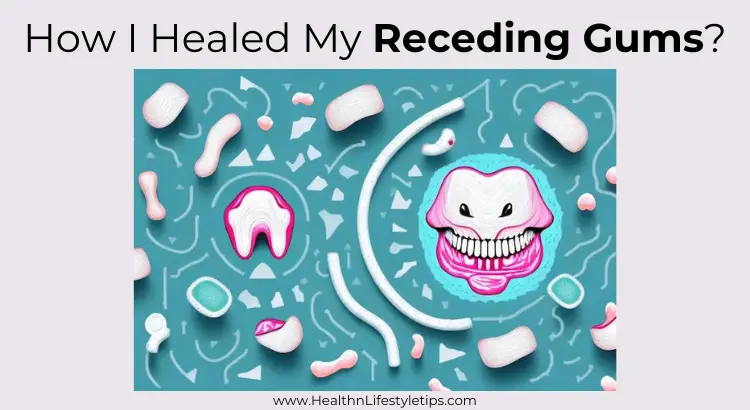Receding gums can be a painful and distressing issue that affects your oral health and self-confidence. As someone who has personally battled with gum recession, I understand the frustration and anxiety that comes with this condition.
In this article, I will share my journey of understanding, healing, and maintaining gum health post-recovery.
Understanding Gum Recession
Your gums are vital in protecting your teeth and keeping them in place. Gum recession occurs when the gum tissue surrounding your teeth wears away, exposing the tooth roots. Left untreated can lead to sensitivity, tooth decay, and even tooth loss.
Gum recession is a common dental condition that affects many individuals. Understanding the causes, symptoms, and potential consequences of gum recession is important to take appropriate preventive measures and seek timely treatment.
What is the Gum Recession?
Gum recession is a condition where the gums pull away from the teeth, creating gaps or pockets between the teeth and gums. These pockets can become breeding grounds for bacteria, leading to gum disease and other dental problems. It is a progressive condition that worsens over time if not addressed.
When the gum tissue recedes, the roots of the teeth become exposed. This can cause sensitivity to hot and cold temperatures and pain and discomfort while eating or drinking. The exposed roots are also more susceptible to tooth decay and may lead to cavities.

Causes of Gum Recession
- Several factors contribute to gum recession. Poor oral hygiene is one of the main culprits. Inadequate brushing and flossing can lead to the buildup of plaque and tartar, which can irritate the gums and cause them to recede.
- Aggressive brushing techniques can also contribute to gum recession. Brushing too hard or using a toothbrush with stiff bristles can damage the delicate gum tissue and cause it to recede.
- Tobacco use, whether smoking or chewing tobacco, is another significant risk factor for gum recession. The chemicals in tobacco products can irritate the gums and impair their ability to stay healthy.
- Hormonal changes, such as those during pregnancy or menopause, can make the gums more susceptible to recession. The hormonal fluctuations can increase blood flow to the gums, making them more sensitive and prone to recession.
- Genetic predisposition also plays a role in gum recession. Some individuals may be more genetically prone to developing gum disease and recession, even with proper oral hygiene practices.
- Certain medical conditions, such as diabetes and autoimmune disorders, can also increase the risk of gum recession. These conditions can compromise the immune system and affect the health of the gums.
Symptoms and Signs of Receding Gums
Recognizing the early signs of gum recession is crucial for early intervention and treatment. Some common symptoms include tooth sensitivity, long-looking teeth, exposed tooth roots, swollen or bleeding gums, and bad breath.
Tooth sensitivity is often one of the first signs of gum recession. You may experience discomfort or pain when consuming hot or cold foods and beverages. This sensitivity occurs because the exposed tooth roots lack the protective enamel that covers the crowns of the teeth.
Long-looking teeth are another indication of gum recession. As the gum tissue recedes, more of the tooth becomes visible, giving the appearance of longer teeth. This can affect the aesthetics of your smile and may cause self-consciousness.
My Battle with Gum Recession
Like many others, my journey with gum recession started with the initial discovery and reaction. I noticed that my teeth appeared longer, and my gums seemed to be pulling away from them. My heart sank, and I felt a sense of dread as I realized that something was wrong.
Initial Discovery and Reaction
I immediately turned to the internet in search of answers. The information overload only fueled my anxiety. I knew I needed professional help, but the emotional impact of gum disease weighed heavily on me.
The Emotional Impact of Gum Disease
Dealing with gum disease or any dental issue can affect your emotional well-being. I felt ashamed of my receding gums, fearing that others would judge me for it. It affected my self-confidence and made me hesitant to smile or socialize.
Seeking Professional Help
After mustering the courage, I made an appointment with my dentist. The moment I sat in the dental chair, I felt a sense of relief knowing that I was taking the first step towards healing. My dentist thoroughly examined my gums, explained the causes of gum recession, and recommended a treatment plan tailored to my needs.

The Healing Process
Throughout my healing journey, I realized that dental treatments alone wouldn’t be enough to restore my gum health. It required a holistic approach that involved not only professional interventions but also lifestyle changes.
The Role of Dental Treatments
My dentist performed scaling and root planing, a deep cleaning procedure that removes plaque and tartar from below the gum line. This helped eliminate the bacteria causing the gum recession. Additionally, I underwent gum graft surgery to rebuild the receded gum tissue.
Lifestyle Changes for Gum Health
I soon discovered the importance of maintaining excellent oral hygiene. I used a soft-bristle toothbrush and gentle brushing techniques to avoid further gum irritation. Flossing became a daily ritual, and I incorporated antimicrobial mouthwash to keep my gums healthy.
The Importance of Regular Check-ups
Ongoing dental check-ups became a priority for me. Regular visits allowed my dentist to monitor my gum health closely, address any concerns promptly, and provide professional cleanings to prevent the recurrence of gum recession.

Bonus Tip: How to Reverse Receding Gums at Home
To reverse receding gums at home, focus on gentle brushing with a soft toothbrush using circular motions. Don’t forget to floss daily to remove plaque and debris between teeth. Use an antibacterial mouthwash to fight gum disease. Try natural remedies like coconut or sesame oil pulling and applying aloe vera gel directly to the gums for relief and regeneration.
Also, eat a balanced diet rich in vitamins C and D and stay hydrated. Remember to see a dentist for personalized advice and treatment.
Bonus Tip: How to Fix Receding Gums without Surgery
If you’re dealing with receding gums and want to avoid surgery, there are several steps you can take to help improve the situation. First, make sure you’re brushing your teeth gently with a soft-bristled brush to avoid further irritation. Consider using a toothpaste designed for sensitive teeth to help protect your gums. Flossing daily can also help remove plaque buildup and prevent gum recession.
Additionally, using an antiseptic mouthwash can help kill bacteria and promote gum health. Finally, be sure to schedule regular dental check-ups to catch any issues early on. By maintaining good oral hygiene habits and being proactive, you can often improve gum health without surgery.
Conclusion
Healing my receding gums required dedication, perseverance, and a multifaceted approach. From understanding the causes and signs of gum recession to seeking professional help and making lifestyle changes, my journey towards gum health was transformative.
Maintaining a consistent oral hygiene routine and regular dental visits are now integral parts of my life. Remember, if you are battling gum recession, you are not alone. Take the first step towards healing and embark on your journey to restore your gum health.
Sources:
- https://www.webmd.com/oral-health/receding_gums_causes-treatments
- https://www.healthline.com/health/dental-oral-health-receding-gums
- https://my.clevelandclinic.org/health/diseases/22753-gum-recession
